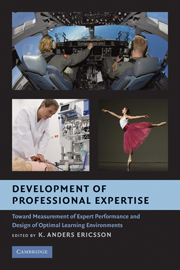 Development of Professional Expertise
Development of Professional Expertise Book contents
- Frontmatter
- Contents
- List of Figures
- List of Tables
- List of Contributors
- 1 The Measurement and Development of Professional Performance: An Introduction to the Topic and a Background to the Design and Origin of This Book
- SECTION 1 CHALLENGES IN PAST AND CONTEMPORARY EFFORTS TO MEASURE AND TRAIN THE OBJECTIVE PERFORMANCE OF PROFESSIONALS
- SECTION 2 PAST AND CONTEMPORARY EFFORTS TO DESIGN INSTRUCTION, TRAIN, AND MAINTAIN PROFESSIONAL PERFORMANCE
- 6 Research on Past and Current Training in Professional Domains: The Emerging Need for a Paradigm Shift
- 7 Designing Training for Professionals Based on Subject Matter Experts and Cognitive Task Analysis
- 8 How to Help Professionals Maintain and Improve Their Knowledge and Skills: Triangulating Best Practices in Medicine
- 9 Advances in Specifying What Is to Be Learned: Reflections on the Themes in Chapters 6–8
- SECTION 3 THE ASSESSMENT AND TRAINING OF SKILLED AND EXPERT PERFORMERS IN THE MILITARY
- SECTION 4 THE DEVELOPMENT OF EXPERTISE AND EXPERT PERFORMANCE
- Name Index
- Subject Index
- References
7 - Designing Training for Professionals Based on Subject Matter Experts and Cognitive Task Analysis
Published online by Cambridge University Press: 04 August 2010
- Frontmatter
- Contents
- List of Figures
- List of Tables
- List of Contributors
- 1 The Measurement and Development of Professional Performance: An Introduction to the Topic and a Background to the Design and Origin of This Book
- SECTION 1 CHALLENGES IN PAST AND CONTEMPORARY EFFORTS TO MEASURE AND TRAIN THE OBJECTIVE PERFORMANCE OF PROFESSIONALS
- SECTION 2 PAST AND CONTEMPORARY EFFORTS TO DESIGN INSTRUCTION, TRAIN, AND MAINTAIN PROFESSIONAL PERFORMANCE
- 6 Research on Past and Current Training in Professional Domains: The Emerging Need for a Paradigm Shift
- 7 Designing Training for Professionals Based on Subject Matter Experts and Cognitive Task Analysis
- 8 How to Help Professionals Maintain and Improve Their Knowledge and Skills: Triangulating Best Practices in Medicine
- 9 Advances in Specifying What Is to Be Learned: Reflections on the Themes in Chapters 6–8
- SECTION 3 THE ASSESSMENT AND TRAINING OF SKILLED AND EXPERT PERFORMERS IN THE MILITARY
- SECTION 4 THE DEVELOPMENT OF EXPERTISE AND EXPERT PERFORMANCE
- Name Index
- Subject Index
- References
Summary
Instructional design (ID) is a field of both applied research and development activities that aims at formulating, executing, and testing theoretically sound solutions for instructional problems in real-life situations. ID focuses on the analysis and design phases that usually occur before the actual development/production and implementation of training systems. As such, ID is part of the more encompassing instructional systems development or design process (ISD). In a traditional ISD approach, every ID will incorporate a task or content analysis. The purpose of the task and content analysis is to organize the content to be taught by analyzing a job to be performed (task analysis) or the content domain that represents the information to be learned (content analysis) (Tennyson & Elmore, 1997). According to Jonassen, Tessmer, and Hannum (1999, p. 3), “task analysis is probably the most important part of the ISD process, and it has been thought so for some time.”
Notwithstanding its alleged importance, Jonassen, Tessmer, and Hannum also state that task analysis is the most often misconstrued, misinterpreted, poorly executed, or simply ignored component of the ID process. This complaint has been voiced not only in the development of training systems, but also in the design of computer systems to support human work (Diaper & Stanton, 2004a, 2004b). The reasons are manifold: Task analysis requires a lot of time, effort, and expertise; it is more of an art than a science; and its usefulness is frequently doubted, which has resulted in a gulf between the outcomes of task analysis and systems design (Schraagen, 2006; Schraagen, Chipman, & Shalin, 2000).
- Type
- Chapter
- Information
- Development of Professional ExpertiseToward Measurement of Expert Performance and Design of Optimal Learning Environments, pp. 157 - 179Publisher: Cambridge University PressPrint publication year: 2009
References
- 5
- Cited by


